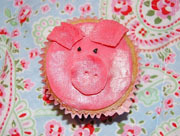

© flickr & siansparkles
まだ胚の段階のブタと成長した時のブタから膵臓の細胞を採取し,糖尿病ラットに2回にわたって移植すると,インスリン投与が必要なくなるほど改善することが示された。この移植では,まずブタの胚から膵臓の細胞を,数週間後には成長したブタの膵臓からインスリンを生産する膵島細胞を採取し糖尿病ラットに移植する。最初に移植される膵細胞は増殖して膵臓となり,インスリンの生産を始めるが,後の膵島細胞の移植が生産をさらに増やす。胚の段階の膵細胞はラットの免疫機構に異物として認識されず,次の膵島細胞の移植も受け入れるよう免疫機構の準備を整える。臨床への応用が期待される。(吉田素子)
In a step toward curing diabetes(1) in humans, scientists at Washington University School of Medicine in St. Louis have alleviated(2) the disease in rats(3) using transplants(4) from both embryonic(5) and adult pigs(6).
The rats adopted the pig transplants as their own and produced enough insulin(7) to control their blood sugar(8) -- all without the need for anti-rejection(9) drugs. The researchers(10) report their findings online(11) in the American Journal of Pathology(12).
Using a two-step(13) approach, the researchers first transplanted(14) a cluster(15) of embryonic pig pancreatic(16) cells(17) into diabetic(18) rats. These cells grow to become the pancreas(19), which houses(20) the islet cells(21) that produce insulin. The embryonic cells primed(22) the rats’ immune system(23) to accept a second implant of islets from adult pigs several weeks later.
The new research -- the first long-term(24), successful cross-species(25) transplant of pig islets without immune suppression(26) -- raises the prospect that it may one day be possible to cure diabetes in humans using a similar strategy(27). Pig cells could overcome the shortage of human islets available from deceased(28) donors(29) and the need for transplant patients to take anti-rejection drugs for life(30).
“While human islet transplants have cured diabetes in some people, there are so few donors that only a small percentage of patients get transplants,” says senior author(31) Marc Hammerman MD(32), the Chromalloy Professor of Renal Diseases(33) in Medicine. “Moreover, those who receive human islet transplants must take anti-rejection drugs for the rest of their lives(34), so essentially they are trading(35) daily insulin shots(36) for immune-suppression drugs, which carry their own risks(37).
(1) 糖尿病 (2) 軽減した (3) ラット (4) 移植組織 (5) 胚の (6) ブタ
(7) インスリン (8) 血糖 (9) 拒絶反応抑制の (10) 研究者 (11) オンラインで
(12) 病理学(American Journal of Pathologyは雑誌名) (13) 2段階の (14) 移植した (15) 塊 (16) 膵臓の
(17) 細胞 (18) 糖尿病の (19) 膵臓 (20) ~がある (21) 膵島細胞 (22) ~の準備を整えた
(23) 免疫系 (24) 長期の (25) 異種間の (26) 免疫抑制 (27) 方法 (28) 死亡した (29) ドナー
(30) 一生 (31) 統括著者 (32) 医師,医学博士 (33) 腎臓病 (34) 一生
(35) (~A for B)Aと引き換えにBを手に入れている (36) 注射 (37) それら自体も危険を伴う


